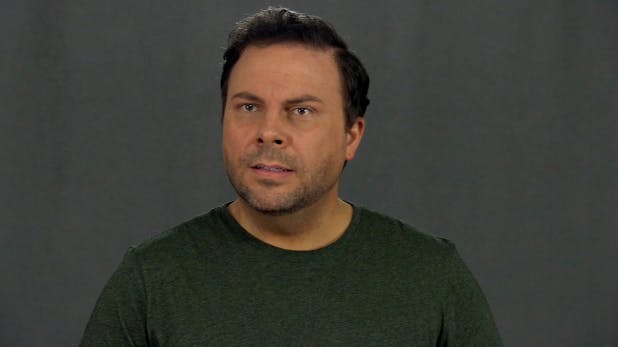To Be (in Person) or Not To Be (in Person): The Self-Tape Audition

To Be (in Person) or Not To Be (in Person): The Self-Tape Audition

Depending on the market you are based in, you may have a vastly different understanding of the self-tape audition. If you're based in LA or NYC, you are occasionally required to self-tape, and when that happens, perhaps you use your cell phone or go to a buddy’s house and have them tape you.
I, on the other hand, am based in Atlanta. And in addition to being a full-time actor for over 15 years, I have co-owned a taping service with my wife since 2010. We were one of the first dedicated taping services in the Atlanta area (and aptly named ourselves Get Taped!).

Here in the ATL, self-taping is THE PRIMARY METHOD by which you will audition. Virtually 100% of your TV and film auditions require you to submit a taped audition. Callbacks only happen for films and sometimes pilots.
I booked my first co-star off of tape in 2005, and since then have booked many more roles off of tape, including recurring co-stars and a top-of-show guest star. And in each of those cases, I never met a single person from production until I got to set. That may sound crazy if you’re from LA or NYC, but it’s the daily reality here.
And due to how long we’ve been self-taping in Atlanta, the technical standards are much higher than in other markets. Here, the casting directors come to expect great lighting, sound, and a reader who is a good actor. Anything less becomes a distraction. Actors who ignore these requirements are in danger of not having their read passed along to the Casting Director (if it goes to the agent first) and then the CD may not pass along your subpar tape to the producers/director.
THIS SUCKS, RIGHT?

For many actors, this new reality creates a very real problem. If you thrive on the in-person connection and crave the insight and direction of the Casting Director, you will constantly be blaming the self-tape as the reason for your low booking numbers.
And there is some validity to that.
When you don’t have the Casting Director in the room with you, you’re left wondering if you’re making the right choice for the role (but that’s another blog topic all together). You won’t know how much physicality is truly necessary for the audition. You’ll agonize over whether you should do an accent or not, and so forth.
On top of that, if you forego coming to a taping service and choose to tape at home, you are suddenly burdened with creating a great tape by yourself. This means knowing a little bit about:
- Lighting - Do you know about 3-point lighting? What about choosing a backdrop color/fabric that will look good on camera?
- Audio - Do you know how to dampen echoes in your room? Do you have a boom mic or lav mic for you so that your audio is pristine and your reader doesn’t overpower your audio? Will your neighbors/dog/screaming child ruin your best take?
- Framing - Do you know how to frame yourself properly? Do you understand the subtle effect that the height of the camera has on your read?
- Reader - Is your spouse or BFF a bona fide actor? Do they make your performance better by knowing how to support you from behind the camera?
- Editing - Do you know how to use simple editing software?
- Compressing - Do you know how to compress your audition into a small file without losing quality?
HOLY CRAP!
Now you can understand why no less than a dozen full-service audition taping studios stay in business year round in Atlanta. The burden of all that technical knowledge is overwhelming for most actors.
BUT, SERIOUSLY?
Isn’t it just about the performance? Yes… in theory. But let’s take a simple under-five role for a TV series as an example. The production team has narrowed the role down to two possible choices. The Director/Studio/Network is watching the top two self-taped auditions on a laptop, trying to make a quick, but thorough decision on who to cast. Both actors fit the look of the show, and both gave good reads. So the final decision could very well come down to the quality of the tape, because of the psychological effect of watching a well-produced audition right next to a poorly produced audition.
CHANGING YOUR ATTITUDE

Many actors lament the taped audition process. But they first need to realize that they’re inevitably getting more auditions overall due to the fact that the casting directors can see more actors digitally than they can in person. Some CDs mix self-tapes and in-persons, but that’s more the exception than the rule here in Atlanta. Overall, your requests for taped auditions will overwhelm your in-person requests.
In addition, self-taping allows the actor more control over their read. They can tape at a time convenient to them, instead of having to fit the CD’s schedule. The actor can also spend as much time as they need to get the right take (we all have left in-person auditions wishing we had been given an additional take). Admittedly, this freedom can lead to laziness, and you can end up doing a dozen or more takes. Perhaps you are memorizing as you go, or you just can’t settle on a single approach to the character. Left unchecked, an actor can lose their ability to perform under pressure when 30 crew members are staring, so actors need to maintain a good discipline of recording only a couple takes.
Regardless of the number of takes, the ability to see your performance back in real time can be an invaluable learning tool for honing your on-camera craft. I realize some actors don’t like watching themselves back on tape, but those actors are missing out on perhaps the greatest benefit of the self-taping experience. I have watched actors on countless occasions see their first take back on the monitor, and then know immediately what needs to be fixed to get to a place where they are confident with their submission. Overanalyzing can plague anyone, but over time you learn how to ignore the minutiae and instead objectively judge your own performance.
And having a library of your past auditions can be used for your growth as well. Your acting coach can review your work to help you grow, and some casting directors will even agree to review your most recent tapes for their office to give you general feedback about your progress.
CONCLUSION
In the end, you can make a compelling argument for or against the taped audition. So it’s up to you to determine you which side of the argument you’ll fall on. Like most things in life, you choose your reality. So if you find yourself angry and resentful when having to tape an audition, you can simply choose to see the benefits of the experience instead. We control so little in this business, but you can control your mindset. So don’t fight the current. Make the best of your self-taping.
Besides, self-taping is not going anywhere in the foreseeable future…
Happy Taping!

Matthew Cornwell is a full-time actor in Atlanta, GA, who also co-runs one
the first taping services in Atlanta called Get Taped. The service, started in 2010,
is a pioneer for what has become the primary way actors get jobs in the southeast.
Almost no TV show has in-person auditions, unless it’s a pilot or it’s at the beginning
of the season. Some films have in-person callbacks, but even that is not necessarily
the norm.
Matthew and his wife have also co-written and co-produced award-winning content,
including three seasons of the web series, Becky & Barry. Matthew is also a teacher
and coach of acting and improv since 2006.
IMDb page:: https://imdb.me/matthewcornwell
Reel on Vimeo: https://vimeo.com/matthewcornwell
Like this blog post? Please share it on social media (Facebook, Twitter, LinkedIn, email etc) by using social media buttons at the top of the blog. Or post to your personal blog and anywhere else you feel appropriate. Thank you.
As always, we welcome thoughts and remarks on ANY of the content above in the Comments section below...
About the Author

Matthew Cornwell
Actor, Editor, Producer, Screenwriter
People say there is no such thing as perfection, but I'm going to find it. * Full-time actor with over 60 IMDb credits, and proud member of SAG-AFTRA. * Co-founder of Get Taped, one of Atlanta's first audition taping services (founded in 2010 with my wife). * Licensed facilitator for the S...










